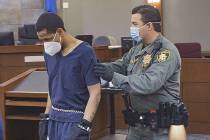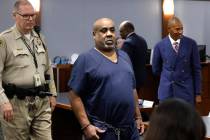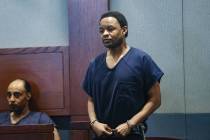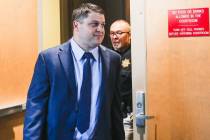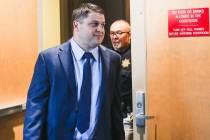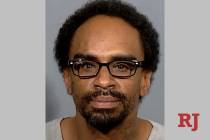Victim’s medical bills and resentment grow as she awaits trial for suspect on house arrest
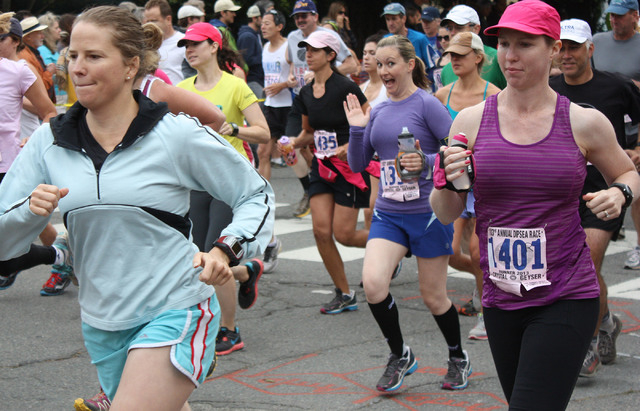
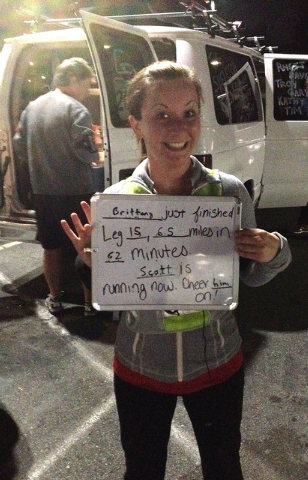
Brittany O’Dale and Robert Stephen Jackson are both runners — although very different kinds.
O’Dale has been pounding the pavement and trails since she was 11. From triathlons to “Blood, Sweat and Beers” races, she’s done it all.
“It’s part of who I am, not what I do for exercise. It’s my fun; it’s my social outlet. It’s absolutely everything,” the 30-year-old said.
Jackson ran from authorities for almost four years. He crisscrossed the country to evade Las Vegas police, who accuse him of shooting four unsuspecting people on the crowded Strip on Aug. 19, 2007.
O’Dale, a San Francisco resident, was in Las Vegas for her bachelorette party when police say Jackson’s random gunfire struck her in the leg. Now her running days are likely over, and she is questioning why her elusive shooter is on house arrest — instead of in jail — while they both await his trial.
“What makes me so upset is that he’s literally sitting at home, mostly unaffected by what’s happening. Almost seven years from this, and I’m still thinking about it every day,” she said. “For all I know, he could run away again.”
The early morning shooting in front of Jimmy Buffett’s Margaritaville happened after several Squad Up gang members, including Jackson, brawled with rival Wood gang members, police said.
Authorities say Jackson fired five shots from his handgun, injuring four bystanders. Three were tourists. None of the 20 gang members in the fight were hurt.
By the time Jackson was captured in Chicago four years later, he had been featured five times on “America’s Most Wanted” and named to the U.S. marshals’ 15 most wanted fugitives list. He was indicted on 11 felonies, including five attempted murder charges.
District Judge Linda Bell set bail at $1 million after prosecutors noted Jackson’s talent for hiding and changing his identity.
Prosecutors said that when Jackson was arrested, he said his name was Sa-El and claimed diplomatic immunity because he was a member of the Moorish Nation, a religious group based in Chicago that espouses black empowerment. His then-pregnant girlfriend knew him as Akeem Jackson.
Jackson’s bail was later cut in half on a technicality, because Bell couldn’t override the $500,000 bail set by a judge in Justice Court. High-priced defense attorney Tom Pitaro argued for even lower bail in a hearing in November 2011, but Bell said she wasn’t budging.
“Court stated she understands (Jackson) does not agree, but that is her decision and she is not going to change her mind,” Bell said, according to the court minutes.
But in a hearing in July 2012, Bell agreed to reduce Jackson’s bail to $250,000 on condition he be placed on house arrest.
Bell didn’t respond to inquiries about why she changed her mind.
Las Vegas police Deputy Chief Todd Fasulo, who oversees the jail, said people on house arrest must wear electronic GPS ankle bracelets. He said it’s rare for someone to flee, although it has happened.
“You can’t just unsnap the bracelet,” Fasulo said. “It has to be cut off.”
If Jackson runs, he’d have more experience than most fugitives. And he’d likely have help. Before being arrested in Chicago, Jackson lived in New York, Florida and Washington, and prosecutors said family members likely aided him.
In Washington, Jackson tried to enlist in the military but was rejected because of his warrant for the Strip shooting.
The evidence against Jackson appeared to be overwhelming, even though none of the victims saw the shooter.
Eric Pratt, who was with Jackson on the night of the shooting, testified to the grand jury that he witnessed Markus Burton give a gun to Jackson, who was wearing a green, collared shirt. Pratt then saw Jackson fire into the crowd.
Pratt told the grand jury he recognized the gun because he had sold it to Burton.
Investigators were able to track Jackson on video surveillance because of his green shirt, which he dumped in a trash can, where it was recovered.
Jackson’s DNA was found on the shirt, authorities said.
Pitaro argued Jackson had no idea he was wanted by police during his four-year life on the lam.
“Jackson was not on the run during this time period. Rather, he was trying to figure out what he wanted to do with his life,” Pitaro argued in his motion to reduce bail.
Prosecutors have fought bail reductions at every turn, arguing that Jackson was well aware he was wanted by Las Vegas police for the shooting. Why else would he have changed his name? they asked.
O’Dale found out about Jackson’s release when researching the case online. She was upset that nobody called her.
“For all I know, he’s sitting at home drinking a Corona and hanging out with his buddies while I’m losing the things I love,” she said.
For all O’Dale knows, Jackson might not even be home.
Jackson can leave his house with permission from a correctional officer monitoring his whereabouts. And that’s apparently not enough for him.
“House arrest is hindering Jackson from performing many essential duties,” Pitaro wrote in a motion to modify the terms of his client’s release.
Jackson, a budding entrepreneur, has started a film and photography production company. But a 6 p.m. curfew has hindered him from meeting clients and “building strong business relationships,” the motion said.
He also lives with his grandparents and is their primary caretaker. They are elderly and incontinent, and he must clothe, feed, and bathe them each day. His grandmother suffers from dementia and can’t leave home without Jackson’s help.
Judge Elizabeth Gonzalez has taken over the case. On Monday, she is expected to hear arguments on the conditions of Jackson’s house arrest.
Since returning to Las Vegas in handcuffs, Jackson also married his girlfriend. His wife is expecting their second child.
“Jackson would like to be able to leave freely to go to his wife’s place to help take care of their child and baby,” Pitaro’s motion stated.
He also wants permission to stay overnight with his wife after the baby is born. The baby is due in a few weeks.
O’Dale can relate to Jackson’s marriage problems. Because of the shooting, her father had to carry her down the aisle for her wedding. She doesn’t want to blame the shooting for the failure of her relationship, but noted the stress her injury put on the newlyweds.
“It’s incredibly taxing on a marriage to play caregiver for six months,” she said. “The first six months are supposed to be the most fun.”
The shooting has overshadowed many good moments in her life, she said. She thinks about it often.
O’Dale remembers the blood on her “Sexy Little Bride” bachelorette sash during the ambulance ride, and doctors warning that she might lose her leg.
She was lucky. Doctors inserted a titanium rod from O’Dale’s knee to her ankle, and she ran a triathlon just a year after the shooting.
But six years took their toll. Her injured leg is now half an inch shorter than her other leg, and she has suffered from constant stress fractures on her “good leg.”
“It impacts the ground so much harder, O’Dale said. “My doctor says I should find a new hobby or risk doing permanent damage to my leg.”
O’Dale has paid thousands of dollars in therapy and medical bills, and she has wasted a lot of mental energy. She is notified about Jackson’s pending trial every six months or so, and must be ready to jump on a plane to testify at a moment’s notice. But then each hearing is delayed.
A trial has been set for June, but O’Dale is skeptical it will happen.
“I’m getting desperate at this point, because it’s beginning to feel like I will never have justice from Clark County about the wrongs that have been done. I can’t even file a civil case (against Jackson) until this is complete. It’s really despicable.”
Prosecutor Danielle Pieper said she knows the victims in the case are anxious.
“I understand the victims are frustrated, but we have to work within the system to achieve justice for them,” Pieper said. “We still plan on prosecuting this case to the fullest extent.”
O’Dale hasn’t been back to Las Vegas. She is starting to doubt whether justice is ever coming.
“Is this the sort of outlook for people who shoot people (on the Strip)? I don’t know. You can spend three or four years sitting at home, and then cut a plea deal or something. It doesn’t really seem like a deterrent.”
Contact reporter Mike Blasky at mblasky@reviewjournal.com or 702-383-0283. Follow @blasky on Twitter.











